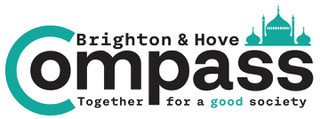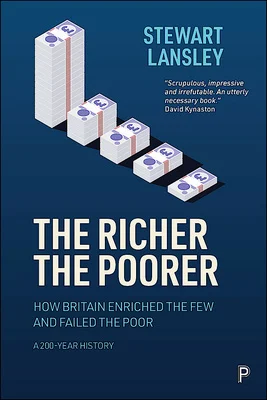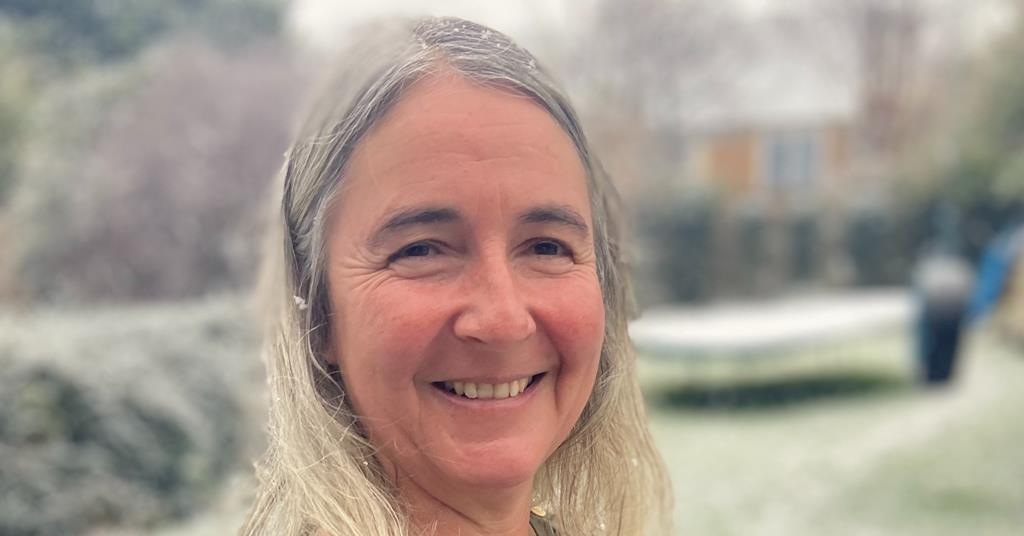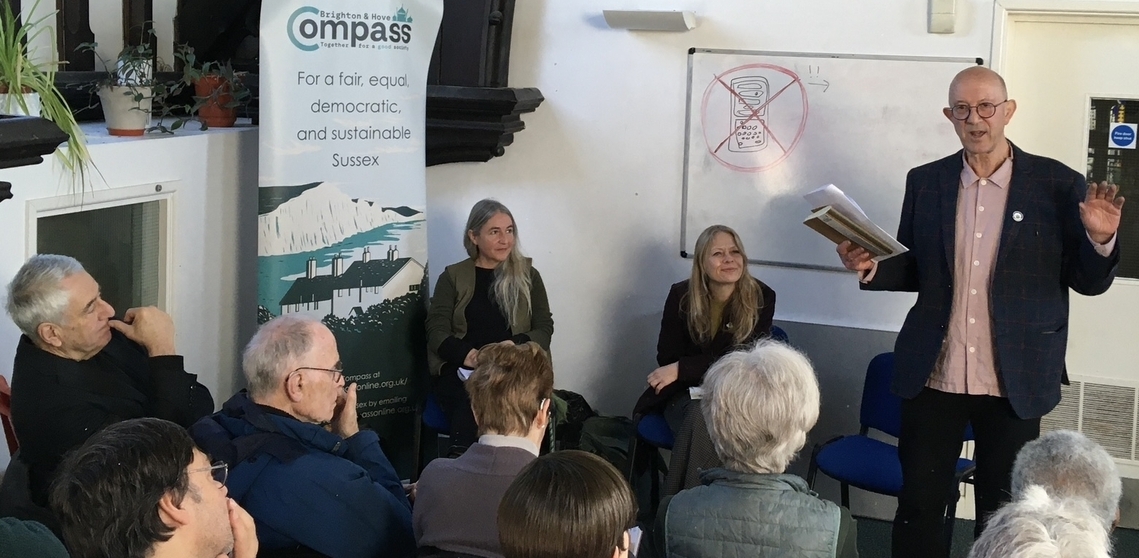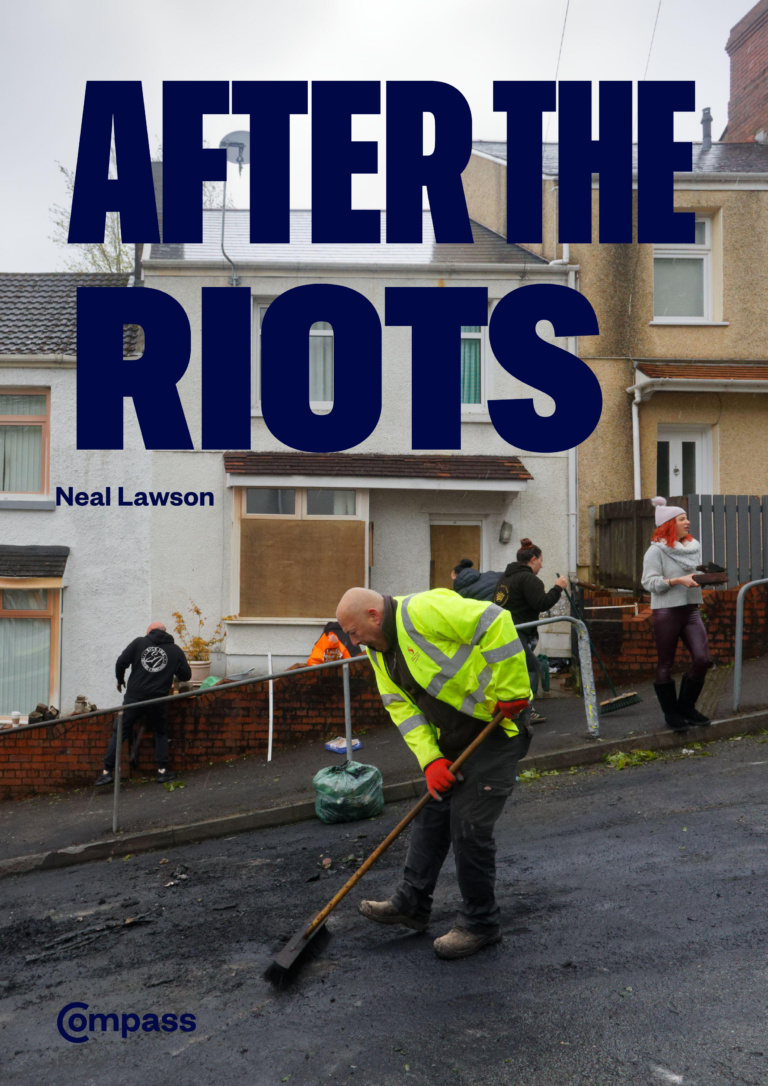On this page you can read detailed updates on what happened at our bi-monthly coffee mornings and other events.
It also contains links to other information and documents that may be of interest.
The Political Economy of the Food System - How it impacts us and what we can do about it

Notes from Brighton & Hove Compass Coffee Morning
29 November, 2025
To mark the conclusion of the 30th UN Climate Change COP in Brazil, we looked at the food system and its impact, not just on carbon emissions, but on almost every aspect of our lives. We wanted to understand how it works and what we, as Compass people, can do to resist the almost intolerable pressures.
We had three great speakers to help us explore different aspects of the issue.
Stuart Gillespie is an Honorary Associate at the Institute of Development Studies at the University of Sussex. He has numerous publications and his latest book is Food Fight, published by Canongate.
Ali Ghanimi is Head of Partnerships and Programmes at Brighton & Hove Food Partnership and leads the city’s food strategy work.
Ben Simanowitz is involved with the Plant-based Council campaign which is seeking to get councils across the country to adopt formal commitments to shift catering and food procurement towards plant-based options.
The discussions reached across many areas: from the political power of the farm and agri-business lobbies, to rapid climate change and the major equity issues involved not to speak of the cultural contexts around food including the resistance of some consumers to change. We heard about impacts at national and local levels and right down to project and community-based activities in Brighton. The breakout groups generated many questions for general discussion and there were also questions from the floor. It was a very animated morning and people went home informed, and empowered. All three speakers went down very well.
As a practical contribution, Ali suggested a number of ways people can support the local food system:
· Support our winter appeal to donate as many tins as possible to local food banks. Support our winter appeal - Brighton and Hove Food Partnership
· Cookery class gift vouchers make lovely presents and help pay for cookery sessions for those who are less advantaged / on a low income Gift vouchers - Brighton and Hove Food Partnership
· The school gardens campaign is a way for people to help their local school create or maintain a garden so that children can develop skills to grow their own food Dig For Schools - Growing Science, Nature & Teamwork with School Gardens - Brighton and Hove Food Partnership
· Buy local and support local, ethical food producers. B&HFP has a buy local tab on our website home page Brighton and Hove Food Partnership
· There are lots of ways to volunteer to help improve our food system from food banks to community composting schemes. Some ideas here: Volunteer - Brighton and Hove Food Partnership
Audience comments and questions in pdf format here.


So, Progressive Politics, What's Next?
Notes from Brighton & Hove Compass Coffee Morning will be Posted Soon
13 September, 2025
Sue Goss, Founding member of Compass, Author of Open Tribe
Sue is a political scientist and commentator working with local government and public services. In this session she posed a question to Mark, the audience and herself: is it still possible to create a progressive 'open tribe' politics amid the turmoil of today's progressive political landscape?
Mark Perryman, Author, Editor of The Starmer Symptom
Mark is a pioneer of a left culture rooted in the convivial and participative rather than command and control. His previous books include The Corbyn Effect, The Moderniser's Dilemma and The Blair Agenda. Mark mixes politics and culture as the co-founder of the self-styled 'sporting outfitters of intellectual distinction', Philosophy Football.
Just a year into a Labour government with a landslide majority. So who could imagine that the old progressive certainties of Labour, Greens and Lib Dems — are under strain. Disillusionment with Starmer's leadership grows, while the Corbyn-Sultana alliance surges, boasting 700,000 sign-ups and polling at 50% in favour of a left-Green pact. Zack Polanski's momentum in the Green leadership race adds to the flux, as does the rise of Reform, now threatening the Tory claim to fame as the most successful party in history.
Where does Compass stand in this maelstrom? In May, Compass launched a new campaign with Momentum and Open Labour to build a more confident, organised soft left within Labour. But can this succeed — and is it the right course of action amid such political fragmentation?
Meeting notes in progress, and will be posted here.
Chatting about Democracy at Brunswick Festival
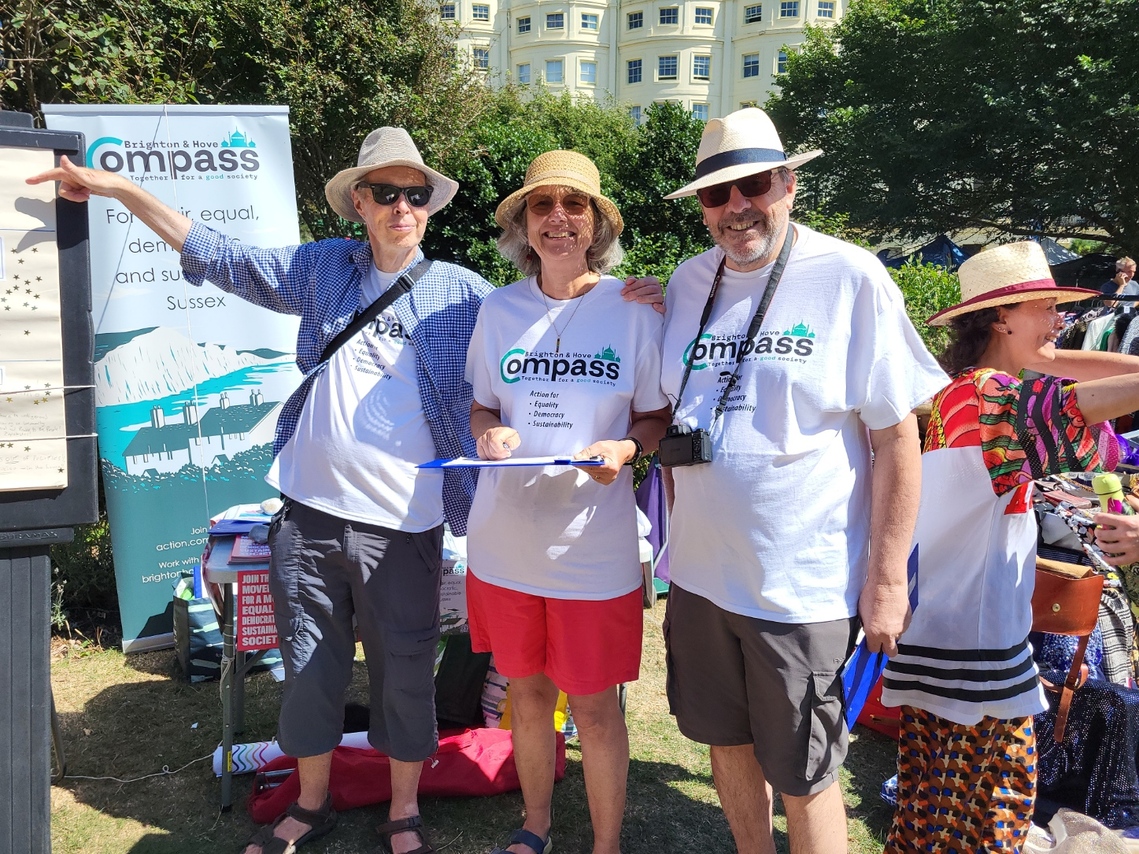 Public engagement at our stall at the Brunswick Festival
Public engagement at our stall at the Brunswick Festival
16-17 August, 2025, 12-4pm Brunswick Square, Hove
Compass volunteers had good fun at our stall at this community festival. We chatted with the public about democracy in all its aspects, and let people know about Compass. We signed up more than 30 new members to Compass, and garnered nearly 90 signatures for Compass' petition for PR. We gave out 50 leaflets about the August Local Government Reorganisation consultation.

Devolution and local government reorganisation in Sussex: what's happening, and how can our voices be heard?

Sussex-wide Zoom meeting
28 July, 2025, 6-7pm
Dr Matthew Fright, Senior Researcher, Devolution Team at the Institute for Government (and a Sussex resident)
Matthew explained the 'what' and 'why' of the proposals, and what consultation is taking place.
Lena Swedlow, Campaigns Manager at Compass, leading on devolution
Lena talked about the campaigning Compass is doing nationally on the issue.
Major changes are afoot to local democracy in Sussex:
- the creation of a mayoral authority for the whole county - currently set to be elected by First Past the Post
- the reorganisation of local goverment into 'unitary' authorities
53 people attended the event, organised jointly with Lewes Compass. After the informative presentations, attendees discussed what follow up might be done, including possible joint campaign efforts with Brighton & Hove and Lewes Compass.
Here is an excerpt from an follow-up email that was sent to the Sussex Compass email list on 10 August:
Devolution, and the creation of a Mayor for Sussex
An accessible update to the process can be found in this B&HCC presentation:
We circulated the government consultation (which closed in April) in a previous mailing. You can read the government's response to this consultation here: https://www.gov.uk/government/consultations/sussex-and-brighton-devolution/outcome/sussex-and-brighton-devolution-consultation-response
For more background on the issues, please see notes of our 10 May coffee morning on Devolution, below.


So What's Poverty Got to Do With It?
Notes from Brighton & Hove Compass Coffee Morning
Notes in pdf format here
19 July, 2025
Andrea Cornwall, Professor of Global Development & Anthropology, Kings College London
Andrea works on questions of rights and justice in relation to gender, participation, democracy and development through an anthropological lens. She is an advocate for inclusive development.
Reyna Kothari, CEO and Consultant at The Old Boat Corner Community Hub, Hollingbury
Reyna has more than 25 years of strategic business management in the UK and abroad and is an adviser to many third sector organisations with strategic planning, finance and community engagement.
Poverty has far-reaching consequences - not just for those who experience it, but for the wellbeing of our communities, our social fabric, and the health of our democracy
PART 1: THE PRESENTATIONS

There were 30 people present and we asked the two speakers to explore not only the human cost of poverty, but what inequality means for our communities, our wellbeing, and our democracy.
They both had very interesting contributions, coming at of it from the two different angles. Reyna went first, with her very specific, local, case-based experience. Andrea followed with a national perspective and a framing of the wider issues.
This is a short outline of the key themes and insights summarising the presentations and the discussion and questions which followed:
1. Poverty is complex, widespread, and decidedly human
Poverty is not caused by a single event - it is a multifaceted crisis affecting housing, food, energy, dignity, and community belonging.
Reyna’s personal stories emphasized how quickly people can fall into poverty due to unforeseen events like bereavement, job loss, or illness.
Poverty also touches a wide demographic: pensioners, students, children, and working people whose wages have not kept up with the increasing cost of living.

2. Local realities: the Brighton & Hove context
Reyna recounted how, in the apparently rich and progressive Brighton:
-
43 people died on the streets last year (one of those present suggested the figure must be an underestimate)
-
50+ emergency food providers support to over 6,400 people.
-
Over 1,000 children are in temporary accommodation
-
Even professionals are forced into temporary housing or living in camper vans due to housing unaffordability.
-
The basic issue is that household money coming in doesn’t cover the basic costs
-
Energy poverty is especially difficult - people restrict heating to a single room or live without cooking.
-
Many families choose between food and heat, or work and childcare.
3. Dignity and human needs
Andrea spoke about how access to shelter, food, and warmth should be framed as basic human rights, not luxuries.
The mental toll of poverty is immense. Reyna mentioned a case where a child wanted to work to support struggling parents. She had a parent emailing at 2 a.m. in despair.

4. Systemic and political drivers
Andrea in particular talked about the prevalent structural failures:
-
Cuts in public services.
-
Inadequate welfare support.
-
Inequality in political voice and democratic disengagement - voters in deprived areas have 20% lower turnout. It is this economic injustice that is the breeding ground for Reform and the snake oil it peddles.
5. The role of community organizations
The third sector (nonprofits, community centres etc) was described as the “fourth emergency service.”
Community hubs provide dignified, stigma-free support, offering food programmes, warm spaces, peer-led initiatives like community cooking. But such organizations are overburdened, underfunded, and (in any case) are not a substitute for state responsibilities.
6. Global comparisons and inspiration
Andrea was very keen on the Brazilian model of citizenship education + basic income. It teaches rights, dignity, and democracy and helps women move into skilled trades with confidence and agency. The point is that poverty reduction must include political empowerment as well as economic support.

7. Hope and vision for change
Both speakers envisioned:
-
A society where needs are met with dignity.
-
People are not just surviving, but thriving.
-
Communities have a real voice in shaping services and policies.
-
There is a partnership between government and civil society, grounded in mutual respect and trust.
Andrea made a short pitch for Universal Basic Income and also democratic reforms like participatory budgeting and citizen assemblies.
PART 2: QUESTIONS
There were many questions from the floor asking about all sorts of subjects and these were summarised by topic: the powers of local government to impact change, what would happen after devolution, how Reform was doing in the seats where poverty was most prevalent.
Andrea was very insistent about the benefits of writing to your MP and demanding answers, giving examples of how she had even managed to get positive responses from her local MP - Keir Starmer’s - office. She also observed that, paradoxically, the Covid crisis had been a catalyst for new democratic initiatives and these showed that there was good reason for hope.
Reyna was keen on citizenship courses both at school and at college and there was a good discussion about that.

Andrea said the single most important thing government can do is to reframe the taxation discussion. This is a subject in itself but she was very insistent that a reframing of the narrative towards how taxpayers were ‘contributors’ would improve understanding and engagement and pay dividends in fending off the alienation that Farage feeds off with his fabulous stories and easy answers.
Reyna was very strong on the merits of the third sector which is especially impressive in Brighton and Hove and is carrying enormous weight as the state struggles with capacity and direction. The Old Boat is getting 3000 visitors a month.
Andrea was very determined on the benefits of nationalising the water industry although a woman from the floor was sceptical about the economics of this. Andrea also thought that when it came to defence policy we might learn a lot from Costa Rica which famously maintains no standing army.
FINAL THOUGHTS
“Poverty is not just stress and hunger. It’s the denial of joy, dignity, and hope.”
“How have we got to a point where being warm, fed and sheltered is a luxury for so many?”
“If you have money in the bank and don’t need to use these services, you are in a very different position than most people.”
Devolution - Changes Are in the Works in Sussex - How Can Our Voices Be Heard?
Notes from Brighton & Hove Compass Coffee Morning
Notes in pdf format here
10 May, 2025
Dr Matthew Fright, Senior Researcher, Institute for Government, Devolution Team
Cllr John Hewitt, Cabinet Adviser for Devolution and Local Government Reorganisation at Brighton and Hove City Council
What are the local government reforms currently under way in Sussex and will we the citizens have a greater or lesser voice once these are implemented? These were the questions that brought a keenly interested and lively audience to the Cornerstone Community Centre in search of answers from Dr Matthew Fright (Institute for Government) and Councillor John Hewitt (Brighton & Hove Council).
Dr. Fright explained how the government‘s White Paper promotes devolution to foster economic growth and local innovation. The independent Institute for Government is broadly supportive. In Sussex, there will be a newly created Mayoral Authority for the whole county, presided over by a directly elected mayor. While 90% of journeys stay within Sussex, questions remain about whether we have a sufficient shared regional identity to make devolution work for us. Alongside the creation of the Mayoral Authority, local government in Sussex is being reorganised into 3-5 single tier Unitary Authorities, each with a population of around 500,000. Whereas Brighton & Hove is already a unitary authority, for the county council areas this means dismantling the current two-tier system, a task which poses logistical and democratic challenges.
Councillor Hewitt stressed the importance of citizens’ input into the changes in local government. Government’s tight consultation timeline drew criticism, with only 500 public responses to Brighton and Hove Council’s initial consultation about a possible revised ‘footprint’ for the B&H unitary authority. There will be further consultation about these proposals over the summer. Key concerns about the creation of a Sussex Mayoral Authority include fair representation from diverse Sussex communities with differing problems, such as in Brighton the high rate of children in care.

You can read a fuller report of the event here.
It's the Economy, Stupid. 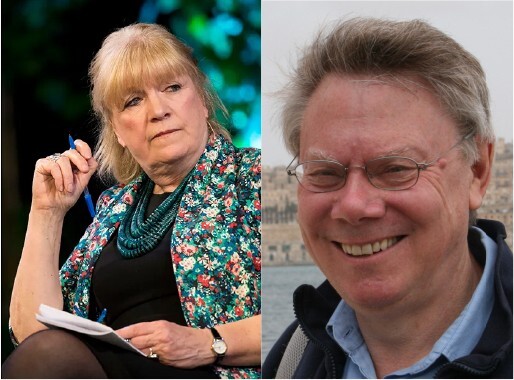
Notes from Brighton & Hove Compass Coffee Morning
22 March, 2025
Polly Toynbee, Guardian Columnist and Author
Stewart Lansley, Progressive Economy Forum Fellow and Author
With the economy high on the news agenda, warnings of massive public spending cuts, and the Chancellor’s Spring Statement due in a few days, this could not have been a more timely event – and the room was packed with Compass supporters eager to hear from our two expert speakers.
We heard first from economist Stewart Lansley – visiting fellow at the University of Bristol, Compass Associate, Council Member of the Progressive Economy forum, and author of The Richer, The Poorer and a brand new Compass report: Paying for a decade of national renewal. Stewart argued that, despite the dire conditions inherited by Labour, there definitely is an alternative to their current strategy of adhering to strict fiscal rules along with a reliance on the proceeds of growth alone (the prospects for which are not encouraging) to fund economic and social renewal. Instead, we need a more equal society, with a restructured, fairer tax system updated in recognition of the vast increase in wealth within the economy over the last 30 years. And in addition, a higher level of social ownership, and much tougher regulation over extractive capital.
Offering her responses to Stewart’s thoughts and her expert political analysis was Polly Toynbee, Guardian columnist and author of many books, most recently (with David Walker) The only way is up: How to take Britain from Austerity to Prosperity. Polly explained how her book aims to set a ‘baseline’ for Labour, chronicling in detail the dire situation Labour has inherited, as a comparison point to evaluate the actions of the Labour government, and, as was the case for Sure Start, to show that social programmes can really work. The context for Labour’s current approach is the influence of the Treasury and the right-wing media – to counter that, we have to start persuading people outside our ‘bubble’ to view tax more positively - as the means by which we collectively secure many of the things we really value in life. Whilst deploring the disability benefit cuts, Polly had some optimism that Labour would become less timid over time, not least because of its commitment to reducing child poverty in the course of this parliament.
You can read a full report of the event, including a lively Q&A session with a very engaged audience, here.
There was an opportunity to buy copies of Polly and Stewart’s latest books.
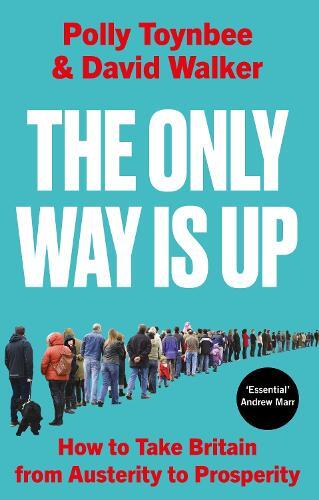
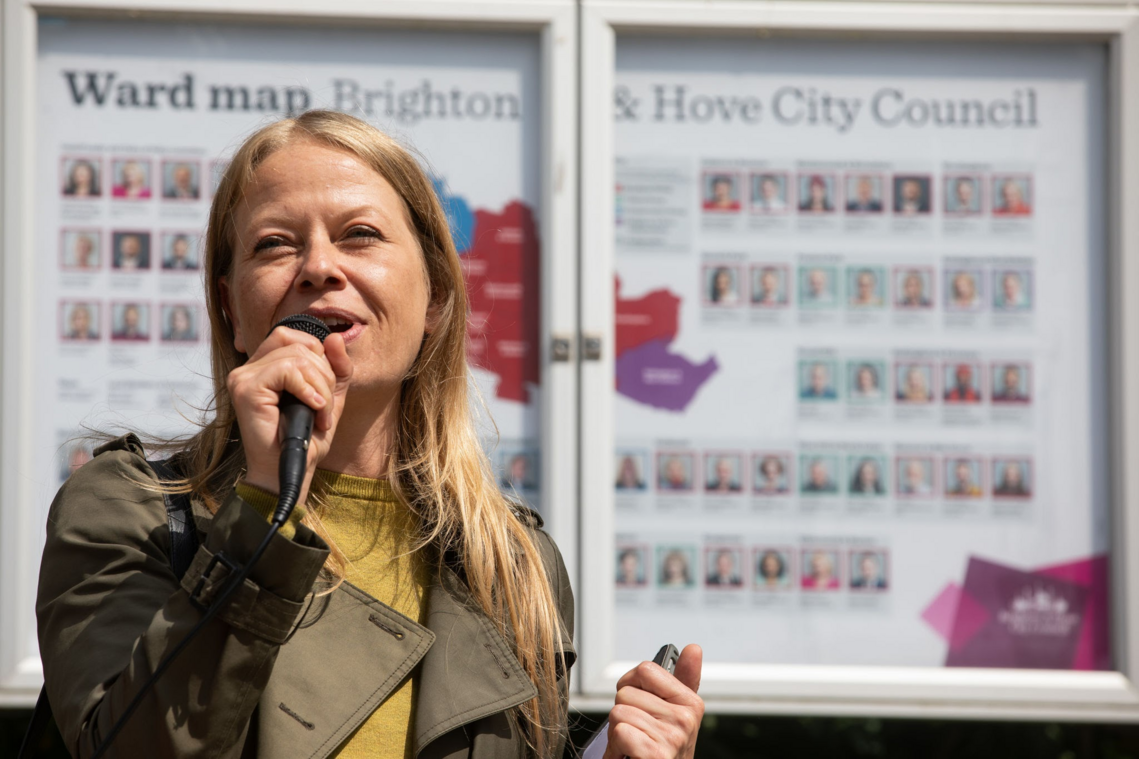
What Now for Climate Action?
Notes from Brighton & Hove Compass Coffee Morning
25 January, 2025
“Plan and be ready to go,” advised Sian Berry, giving us motivation to
be ready when national funding gets decided and pushed down to our
local councils.
“There is nothing better than co-creation,” said Emma Montlake, as a way to make a difference to the environment and in our lives. Participation is a bridge between the miserable global crises and extraordinary local people.
32 Compass members and supporters gathered at the Cornerstone Community Center in Hove and intently engaged in co-creating our democracy as we took in the current state of government’s efforts to grapple with nature’s decline.
Sian shared her perspective from the national level
- Four Green MP’s are starting to make a difference. Cross-Party work matters as well.
- Next 6 months are crucial. There’s a lot for campaigners to do,
as Labour may need a push.
- Use the B&H Decarbonisation pathway study to stimulate ideas.
- The most important government reform: change the Treasury rules to add health and wellbeing to the cost:benefit analysis.
E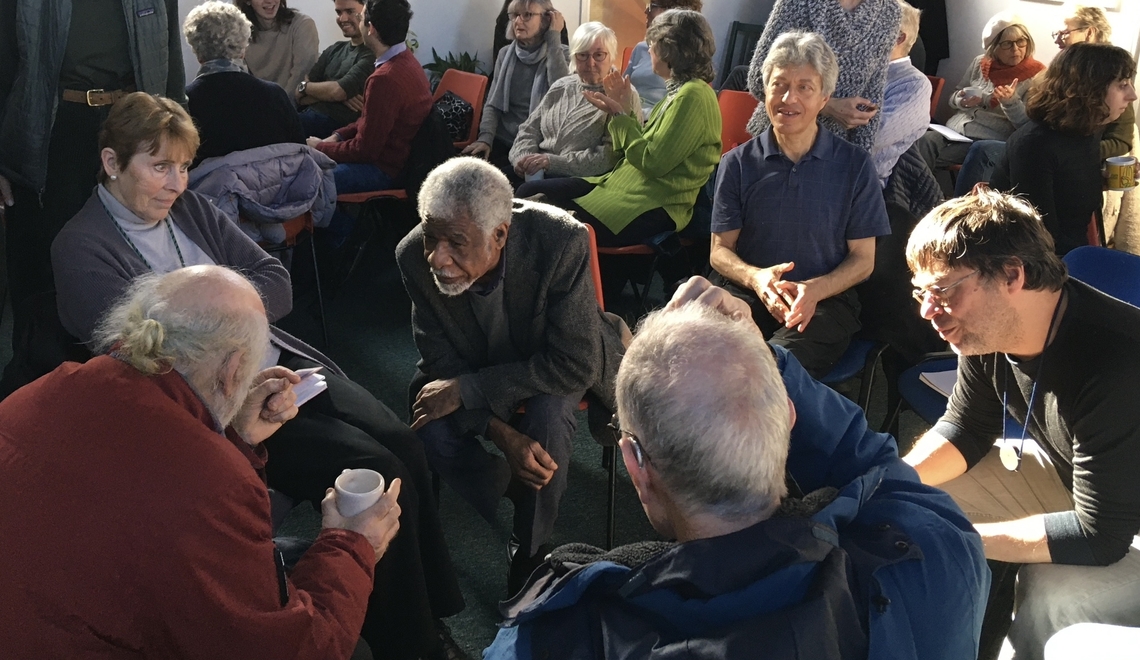
- Nature and climate work together. It makes no sense to put green infrastructure on pristine nature.
- Community input and local intervention is FUNDAMENTAL for a successful process and outcome.
- Will the Ouse have rights in Lewes? District Council votes on draft Charter in March.
Would PR make a difference to climate and nature policy?
Both Emma and Sian said Yes. Citizens’ voices would be stronger.
T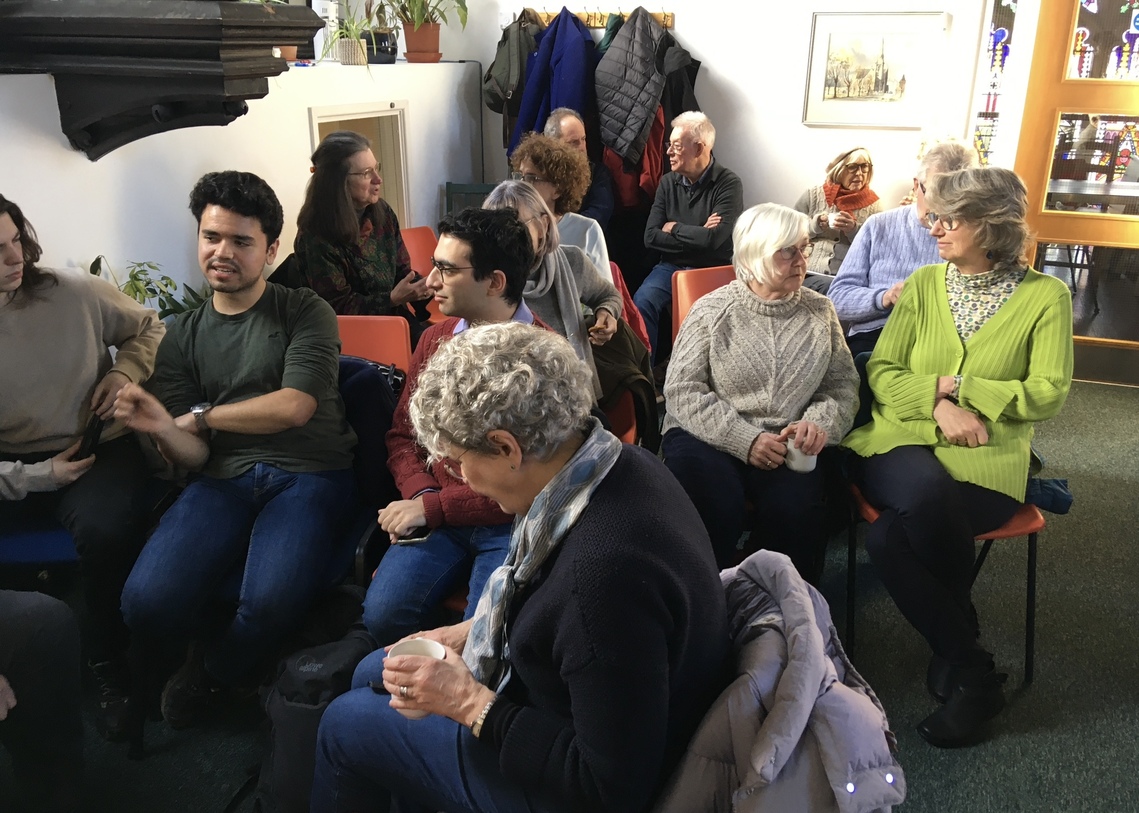
to those who came and made for an energetic morning of civil discourse and camaraderie.
B&H Compass needs your input
Over the coming 2-3 years, B&H Compass will be holding campaigning actions and conversations around the broad theme of democracy and power. Watch this space for more, or contact us on brightonhove@compassonline.org.uk if you have ideas or would like to get involved.
B&H Steering Group: Rosalind Eyben, Janet Hewson, Mialee Jose,
James Joughin, Colin Miller, Chris Smith, Stephen Young
After the Riots - Causes, Impact and Solutions
Notes from Brighton and Hove Compass Coffee Morning
16 November, 2024
‘the embers of hatred, frustration, and alienation still shimmer under the ashes. The violence has subsided for now, but it’s not hard to see, given the context, how something similar, worse even, might arise again – and soon’
– Neal Lawson, Director of Compass
The gathering of 27 Compass members and supporters became “real” right away when guest speaker Neal Lawson, Director of Compass, shared that he felt somewhat uncomfortable about some of what he’d written in his paper, and that he hasn’t pushed the paper out broadly yet, as a result. He felt compelled to write it, however, because it allows us to talk about everything we need to. For example
- We need other things than locking people up and growing the economy unequally.
- If we want to intervene, we need forces – people who vote and think and want the market to serve us rather than the other way around – and policies to intervene in the political economy as well as the financial one.
- Control of borders is necessary. Democracy only works within the borders of a nation-state. Free markets are causing chaos by forcing us to open our borders – moving people from one country to another to make money for them.
- 25 years before 1997, 9,000 immigrants; 25 years since 1997, 6 million immigrants.
- Some people find it difficult when their town changes. Some have the money and confidence to feel comfortable with change. Progressives have to have a compassionate conversation about that.
- The Far right is smart and well organized. They can exploit people who find change difficult. Our Labour majority is at risk in the next Parliament.
What can we do?
Progressives need to be less smug, and more generous. We need to stop “othering” people who’ve had it tough.
How do we get Government to pay attention?
Better than a public Inquiry, get Government to create a new Community Resilience body that would:
- Bring organizations together and make recommendations
- Facilitate deeper considered opinion/response
- Pick a place or 2 to work in – knit together the social cohesion and fabric.
Compass can work on this. It’s at the heart of everything Compass does.
USA is what’s going to happen here if we don’t get it right.
Let’s use this threat to galvanize us.
Attendees moved into breakout groups, which generated many questions for Neal, listed below.
Where is Compass going?
After the discussion, Neal gave an update:
Developing a 5 year strategy so we can be influential when the time arises.
1) Ideas - components of the good society
2) Relationships with Parliament and Mayors, and across progressive parties
3) Relationships with civil society (Greenpeace, Tax Justice Network, Friends of the Earth, 38°, Byline Times, Led by Donkeys)
Crystalize these in campaigns
- Ownership of water
- Devolution
- PR – First past the post promotes the right.
He values Local Groups as the people who make the issues resonate.
Many in the audience were inspired and energized by the political discussion. Thank you, Neal, for making so many connections within our society so we can all work together to improve it.
Questions from the breakout groups
Economy
-
“Growth is good” – Neal – is it? Is this assumption healthy in a world of environmental collapse? Should ‘progressives’ be thinking of alternative measures of a successful society – Whose GDP is it?
-
Are we over-focused on economy compared to society?
-
How to tackle the influence of global finance and big tech Bros. They are bigger than nation states. This is a bigger issue than free markets. What do you do about it?
-
What is the inclination of British people who can afford it to pay more taxes to invest in society?
Democracy and Participation
-
How do we increase participation amongst the disenfranchised or those feeling/believing they are disenfranchised?
-
How do we attract young people to the cause of the democratic left?
-
How to have uncomfortable discussions among ourselves?
-
What are the vehicles - over the next 1/2/4 years – to ensure people are heard and make a difference to people’s lives and the way they feel about their prospects?
Reform UK
-
What can we/local groups do to combat the Reform vote? Ideas from the Compass groups?
-
How do we form a language to speak to Reform voters?
-
How to bridge the disconnect between us and the right/those in power?
-
How do you address inherent social conservatism in the UK?
Immigration and Borders
-
Most of the boat people are Afghans. How do we handle borders in a world devasted by climate change and war?
-
Re borders and the way democracy is exercised nationally: is localism an/the answer? Devolution of more decision making to local communities?
Hope/ What Compass Can Do
-
Request for further info re the consortium with Hope Not Hate please – its objectives? Will it be pushing at an open door in government? In which department/ministry will the trust be placed?
-
Role of social media has been key? How would this be addressed?
-
Trump emphasizes tribes and charismatic leaders. We are in the wrong “woke” tribe. How to get facts and reason to other tribes, and people talking across tribes.
-
Is the choice ‘barbarism or socialism’? And if so, what do we do about it?
-
How do you give people in “deprived” areas hope? Tackle the emotional (with a) calmer rational response?
The Blue Wall Toppled!
Yes after fourteen long years the tory government is gone and so has many Conservative held seats in the south east and Sussex.
Brighton and Hove Compass is proud of the role we played in the victory, along with our friends in Lewes and Horsham we campaigned hard for Labour, LibDem and Green candiates who support PR.
So a huge thank you to our friends and supporters who helped in the campaign.
A month has passed and we can start to take stock of the extraordinary changes that have taken place in Sussex. The political landscape has been upended and the chequerboard of colours that make up our two counties has transformed dramatically in ways inconceivable only five years ago.
We Compass wouldn’t want to claim all the credit for this but we believe that our 'Win as One' campaign and the long running efforts of the three Compass groups in Sussex, with their numerous members and affiliated supporters, had a significant impact in the marginal seats.
Compass groups canvassed in most of the key constituencies, running events and street stalls, promoting tactical voting and leafleting on behalf of the endorsed candidates (the Lewes groups’ activities even caught the attention of the national press). Campaigners also set up a Vote Heart/Vote Smart operation using an online tool to let voters swap their ‘heart’ vote with someone in a seat where the vote would make the most impact, say Green voters in West Worthing swapping with Labour voters in Brighton Pavilion.
On the day, the Conservative Party lost nine seats across the 17 constituencies of East and West Sussex. The map which was once almost entirely blue is now a patchwork of orange and red with that familiar green patch in the middle, the Green Party having held what until then had been its only seat, in Brighton Pavilion. These are undoubtedly historic changes.
All this, and a cautionary tip-toe around what the future might hold, is described in a recent Sussex Bylines article here.
March 6th 2024 - Coffee Morning: Housing
We were very pleased to be joined by Matt Scott, CEO of Thames Life Community Development Trust, and Stephen Hill, who has over fifty years involvement in housing, and was awarded the first RICS 'Social Impact Lifetime Achievement Award' in 2020.
Matt talked about his work as a community worker with Citizens UK in Barking and Dagenham , which property developers refer to as ‘Barcelona-on-Thames’ because of the opportunities they see there.
His perspective was that community development was about people power and taking action. Citizens UK are pragmatic about taking action but is aware of the problems with leaving everything to the market state.
Council planners and private developers used to represent different interests but are now both focused predominately on market viability and therefore no longer balance competing needs. He believes that civil society needs to further wake up to this.
Stephen talked of how he has been involved with Community Land Trusts (CLTs) since 1989. He said that no one waited for permission to set one up, they weren’t invented by a government, they just happened. He then asked the question of what can we do as individuals and groups to tackle the housing crisis without waiting for permission?
He also outlined how affordable housing that benefits communities is often dependent on the generosity of landowners and gave an example of a farmer in Cornwall who was willing to sell some land cheaply to a CLT. One of the challenges we face is that defining a community is often harder in urban areas than it is in rural areas.
The legal definition of a CLT is that it can only exist for wellbeing of community, which mimics the technical requirements of the planning system and it must have open membership for those who live in the area. This definition was opposed by the then Labour government who couldn’t understand why they were doing something with no funds or plans attached. But that was the point. It was a framework for communities not government.
We then moved onto audience questions.
It was posited that there was no housing market in a meaningful sense and a question asked if there was better language that could be used to describe the situation.
Matt suggested we could use phrases like ‘monopoly capitalism’ and ‘land banking’. Stephen had a view that if developers are capitalists then there should be no state support for them, and all state support should go to provide social housing.
It was asked if it would be better for CLTs to be complemented by government rather than going it alone. Stephen pointed out that when Councils build the housing stock becomes eligible for Right to Buy whereas CLT properties are normally exempt. Matt reiterated the importance of civil society rediscovering its own agency.
The discussion then moved on to the Renters Reform Bill. Stephen was keen for an absolute ban on no-fault evictions and reminded us that around 150 Tory MPs are private landlords. Matt pointed out that Right to Buy has changed the way society functions.
To get a better focus on rent control and renters rights Matt suggested that we would need a massive cultural shift away from the concept of a ‘property owning democracy’. Stephen talked about positive developments in this space such as all the good work being done by renter’s unions such as Acorn.
To close the event, Stephen talked of how areas that have had homes built by CLT have experienced transformative effects on their local communities. Matt talked of his view that old hierarchical models didn’t work so well in the modern world and understanding how we build power is central to community organising, reminding the room that there’s more of us than them. If you can flex enough power you can get a good response.
January 13th 2024 - Coffee Morning: Democracy
In Compass we argue that you can't have a good society without a good democracy. But what do we mean by that and how can we achieve it? Fifteen brave souls among those present agreed to explain in one sentence what a good democracy meant for them:
- People feel their voices are heard and their views genuinely taken into account within an accountable and transparent system.
- State institutions protect their rights.
- Decisions would be made at the lowest level (closest to the people);media organisations shown to lie would be banned; participation and decision-making would centre around citizens assemblies.
- The voting system is fair with no hindrance to voting rights and which is independent of any interference from the state or vested interests.
- People feel that their hopes are heard.
- There is good engagement with the community, transparency, clear lines of accountability, freedom of speech and clear separation of powers.
- Transparency and accountability are paramount
- Everyone’s voice is heard in a fair process
- Truth matters
- Putting an ‘x’ in a box every few years is not enough: more direct community participation is required.
- No one is afraid of growing old
- We would have proportional representation.
- Most people participate willingly in decision-making at various levels and in various ways.
- Everyone is equal, rights are respected, especially the elderly and the disabled and parliament is elected by a system of PR.
- There is sensitivity to people’s needs and meta-managerial capacity in its leaders.
- Everyone is kind, listens and takes their turn to speak.
Rosalind Eyben then looked at recommendations from recent reports about how to strengthen UK democracy while Colin Miller considered how strong, empowered local communities are fundamental for local democracy
|
CLICK HERE FOR FOLLOW UP READING |
The meeting heard an extract from a letter Peter Kyle, MP for Hove and Portslade, about Labour's plans for strengthening democracy should it be elected (when replying in November 2023 to Compass supporters campaigning for proportional representation). Here it is:
https://www.bhcompass.org.uk/assets/documents/notes-it-s-the-economy-22mar25-2" Keir Starmer made clear at the beginning of this year that Britain needs a completely new way of governing – and that the Westminster system is part of the problem. We have a clear and constructive plan to not only restore public faith and confidence in Government, but to place more and more control and decision-making power in the hands of the communities we serve – where it belongs.
We have already begun the work of laying out how we will practically achieve these goals. The introduction of a Take Back Control Act in our first King’s speech will be our first step to oversee the biggest transfer of power from Westminster in British political history. We will also scrap the House of Lords and replacing it with an elected second chamber which is truly representative of the nations and regions of the UK. We will rebuild British democracy by introducing universal voter registration and extending the franchise to 16- and 17-year-olds.
. That’s why Labour has committed to enter the next election with a commitment to a programme of democratic reform, which would include an open and inclusive process of evidence gathering to look at the options and merits of different voting systems. "
We are in the process of uploading details of earlier events to our archive. Please watch this space.
